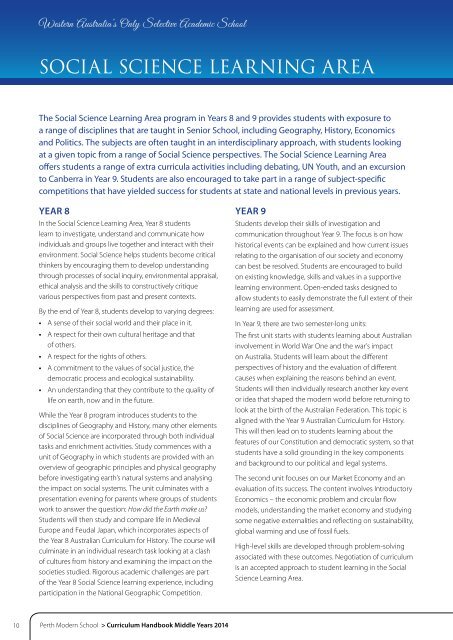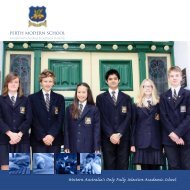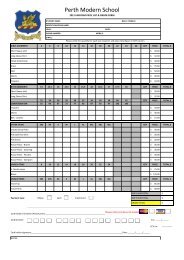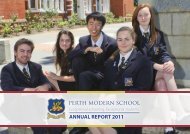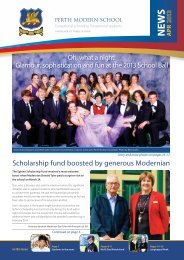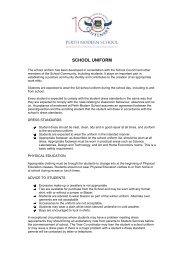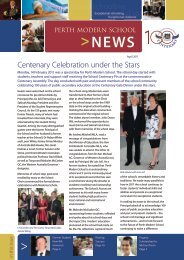Middle Years Curriculum Handbook - Perth Modern School
Middle Years Curriculum Handbook - Perth Modern School
Middle Years Curriculum Handbook - Perth Modern School
Create successful ePaper yourself
Turn your PDF publications into a flip-book with our unique Google optimized e-Paper software.
Western Australia’s Only Selective Academic <strong>School</strong>social Science Learning AreaThe Social Science Learning Area program in <strong>Years</strong> 8 and 9 provides students with exposure toa range of disciplines that are taught in Senior <strong>School</strong>, including Geography, History, Economicsand Politics. The subjects are often taught in an interdisciplinary approach, with students lookingat a given topic from a range of Social Science perspectives. The Social Science Learning Areaoffers students a range of extra curricula activities including debating, UN Youth, and an excursionto Canberra in Year 9. Students are also encouraged to take part in a range of subject-specificcompetitions that have yielded success for students at state and national levels in previous years.Year 8In the Social Science Learning Area, Year 8 studentslearn to investigate, understand and communicate howindividuals and groups live together and interact with theirenvironment. Social Science helps students become criticalthinkers by encouraging them to develop understandingthrough processes of social inquiry, environmental appraisal,ethical analysis and the skills to constructively critiquevarious perspectives from past and present contexts.By the end of Year 8, students develop to varying degrees:• A sense of their social world and their place in it.• A respect for their own cultural heritage and thatof others.• A respect for the rights of others.• A commitment to the values of social justice, thedemocratic process and ecological sustainability.• An understanding that they contribute to the quality oflife on earth, now and in the future.While the Year 8 program introduces students to thedisciplines of Geography and History, many other elementsof Social Science are incorporated through both individualtasks and enrichment activities. Study commences with aunit of Geography in which students are provided with anoverview of geographic principles and physical geographybefore investigating earth’s natural systems and analysingthe impact on social systems. The unit culminates with apresentation evening for parents where groups of studentswork to answer the question: How did the Earth make us?Students will then study and compare life in MedievalEurope and Feudal Japan, which incorporates aspects ofthe Year 8 Australian <strong>Curriculum</strong> for History. The course willculminate in an individual research task looking at a clashof cultures from history and examining the impact on thesocieties studied. Rigorous academic challenges are partof the Year 8 Social Science learning experience, includingparticipation in the National Geographic Competition.Year 9Students develop their skills of investigation andcommunication throughout Year 9. The focus is on howhistorical events can be explained and how current issuesrelating to the organisation of our society and economycan best be resolved. Students are encouraged to buildon existing knowledge, skills and values in a supportivelearning environment. Open-ended tasks designed toallow students to easily demonstrate the full extent of theirlearning are used for assessment.In Year 9, there are two semester-long units:The first unit starts with students learning about Australianinvolvement in World War One and the war’s impacton Australia. Students will learn about the differentperspectives of history and the evaluation of differentcauses when explaining the reasons behind an event.Students will then individually research another key eventor idea that shaped the modern world before returning tolook at the birth of the Australian Federation. This topic isaligned with the Year 9 Australian <strong>Curriculum</strong> for History.This will then lead on to students learning about thefeatures of our Constitution and democratic system, so thatstudents have a solid grounding in the key componentsand background to our political and legal systems.The second unit focuses on our Market Economy and anevaluation of its success. The content involves IntroductoryEconomics – the economic problem and circular flowmodels, understanding the market economy and studyingsome negative externalities and reflecting on sustainability,global warming and use of fossil fuels.High-level skills are developed through problem-solvingassociated with these outcomes. Negotiation of curriculumis an accepted approach to student learning in the SocialScience Learning Area.10<strong>Perth</strong> <strong>Modern</strong> <strong>School</strong> > <strong>Curriculum</strong> <strong>Handbook</strong> <strong>Middle</strong> <strong>Years</strong> 2014


